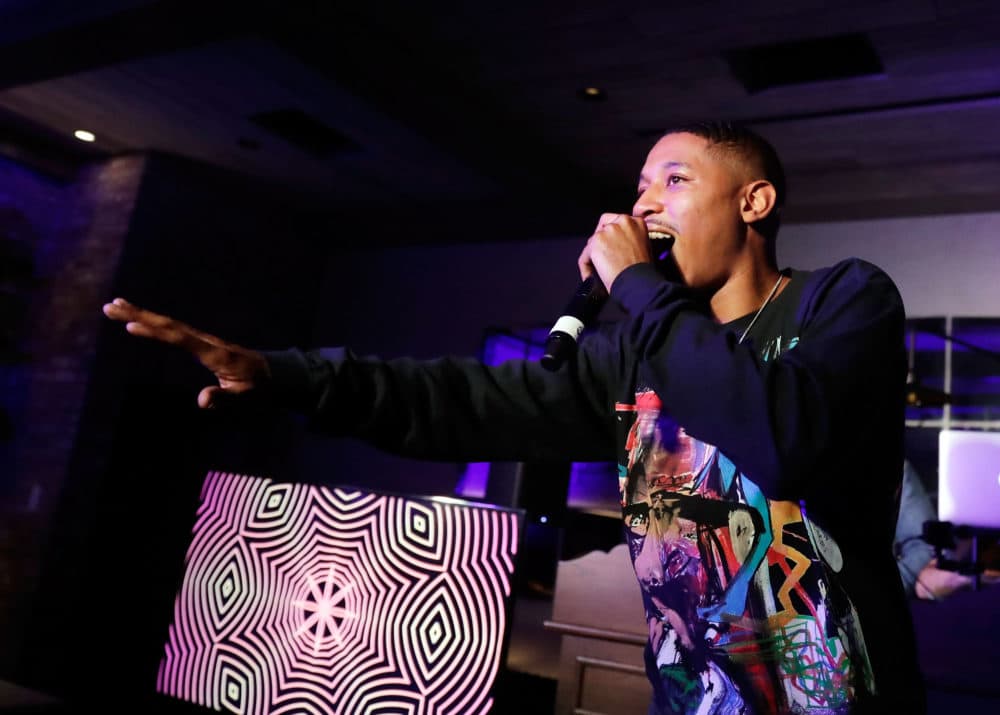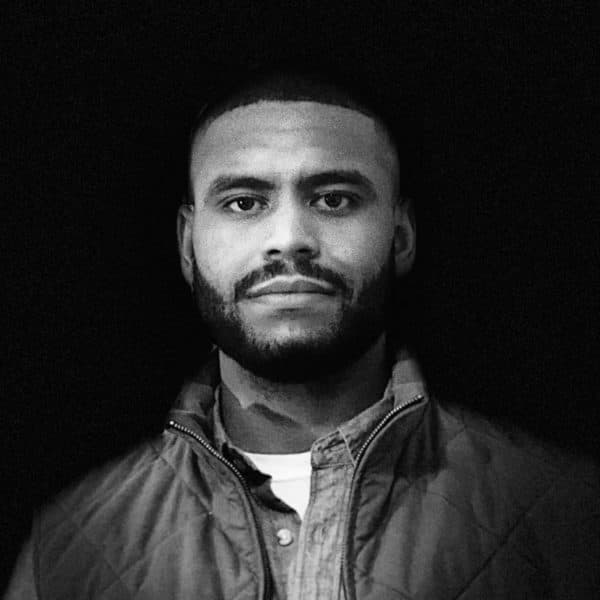Advertisement
How Boston Rapper Cousin Stizz Made It 'To The League'

Cousin Stizz is a 26-year-old rapper from Dorchester, in Boston, Massachusetts. He’s an award-winning artist and something of a hometown hero in Boston. But long before he would sell out venues or be affiliated with an NBA team, Stizz was just a kid from the neighborhood.
Stizz met many of the friends he has today playing football and basketball. These friends quickly became family. And together, they learned how to navigate the neighborhood.
"Sports has always been it," Stizz says. "Like, especially being in Boston — like, all the championships and stuff like that — you know what I'm saying? It kind of goes hand and hand."
Stizz remembers the championships, the parades and even some heartbreak.
"What was it, the ’03 playoffs when we lost?" Stizz says. "The Celtics lost. I shed a tear that year, when we lost in the playoffs. And that’s when I knew, like, ‘Dang, I'm a Boston sports fan.’ Like, my mom couldn't believe how heartbroken I was about it. Like, it was funny at first, and then she seen how really sad I was. And then it got real sad in the house."
The first time he ever went to a game at the TD Garden, Stizz sat in the nosebleeds with the local Boys & Girls Club. The Celtics lost that night, but he was just excited to be a part of the atmosphere.
"The DUN-DUN-DUN DUN-DUN DUN-DUN-DUNNN," Stizz says. "I just remember those, the chants. Like, I don’t remember the music that they played."
Years later, his love of sports and and music would collide in a way many only dream about. Stizz got a call from the Celtics offering him a job for the 2018–19 season.
The Neighborhood
Cousin Stizz was born Stephen Goss. His friends gave him his nickname.
"So it was just like, 'Bro, we can’t be calling you Stephen,' " Stizz says. "And that’s pretty much where it came from. Like ... boom. Stizzy."
He says he owes everything to Dorchester.
"Everything, man. The way I walk, the way I talk, the way I act, the way I think, the way I react, you know?" Stizz says. "It’s all my neighborhood."
Of Boston’s 23 neighborhoods, Dorchester is the largest and most diverse.
"You know, so I got a whole bunch of everything," Stizz says. "But, I ain't grow up in the best neighborhood. Just because it was diverse doesn’t mean, you know, that it was always good."
Crime, poverty, drugs and death were the norm where Stizz grew up. But he knew there was more to life than that.
"Something I always knew is, like, this wasn’t it," Stizz says. "Like, the 'hood wasn’t it for me, you know what I’m saying?"
Advertisement
"Something I always knew, is like, this wasn’t it. Like the 'hood wasn’t it for me."
Cousin Stizz
Stizz says he had a great support system of friends and family. But, the older he got, the harder it became to avoid the negative influences in his life.
"That was, like, around the time I started losing friends and stuff like that, you know what I'm saying?" Stizz says. "I was kind of acting out."
And that's when his mom gave him a choice:
" ‘You either going to the military,’ " Stizz says. " ‘Or, like, God damn — we're gonna ship you out here.’ "
“Out here” meant going to high school in the suburbs. An hour outside of Boston. Away from his friends. Away from trouble.
And that's what he did.
The Suburbs
"I went to Reading," Stizz says. "Reading Memorial High School, in Reading, Mass."
Stizz enrolled in the METCO program.
The METCO program started in 1966 after parents of black students boycotted segregation in the Boston Public School system. Today, nearly 38 suburban school districts offer enrollment to inner-city kids who are looking for alternatives to their local schools.
"It was a culture shock, man," Stizz says. "Like, before that, I only knew what I knew. I only knew about going to school with kids that look like me — act like me, you know? And going out there was completely different. It gave me head start to life almost, in a way."
To get to school on time, Stizz would have to wake up at 5:40 in the morning. His father, who worked construction, would often be his alarm clock. From there, Stizz would hop on a special bus. It took 90 minutes to get from the city to the suburbs.
Every now and then, he would catch a nap. Sometimes, he would listen to music. Most times, he would just think.
"And then I’d go to school and, like, I'd see how things are so much different," Stizz says. "How people are living so much differently, what money could really do, you know? And then I'd go back to the 'hood at 3 o'clock."
The first couple of times Stizz missed the METCO bus, his mom let him off easy. But after his sophomore year, she tightened the reins. That meant if Stizz missed the bus, he’d have to take public transportation to get to school. A ride that would have taken 90 minutes would stretch on for hours.
“It was a culture shock, man. Like, before that, I only knew what I knew.”
Cousin Stizz
"Catch the bus, ride it all the way to the train station," Stizz says. "If you’re getting on the Red Line, you gotta take the Red Line to Downtown Crossing. Then you gotta take the dag-gone Orange Line to North Station. You get off. Then I gotta catch that Purple Line train all the way to Reading."
The commute was a nightmare.
"You got some time on your hands, dog," Stizz says. "You got some time to, like, really do something, you know what I'm saying? So one day, I just decided to write something over a Lil Wayne beat. I think it was "Throw It In The Bag" — yup, on the "No Ceilings" mixtape. And that was the first one. Like, that was the first one."
For years, Stizz didn’t tell his friends he was writing, let alone rapping. And when he finally did tell them, he didn't get the reaction he expected.
"My homies told me I was trash until I got good," Stizz says. "But that’s what real friends are for. My real friends were like, ‘Bro', no.’ But, I ended up getting good. And then they were like, actually, ‘You got something. You might actually got something going for you, so you should probably keep going, bro'.’ And then it completely switched. And it was like, ‘Bet. We rocking 100 percent with it.’ "
'To The League'
In June of 2015, Stizz released "Suffolk County," his debut mixtape. It dealt with a wide variety of themes. But in particular: loss.
"What's your relationship like with death?" I ask.
"Pretty familiar. I’m too familiar for my liking," Stizz says. "It happens, you know? More frequently than I would like it to, around me."
Stizz was in his early 20s when his friend Damone Clark was diagnosed with a rare form of bone cancer.
"F cancer," Stizz says. "Forever, you know what I'm saying? But dog, like, he was a G, man. He took it better than we did. He knew what it was, and he was just a gangster about it, man. He told us we better not cry about it. And we gotta make sure everything — we moving how we supposed to when he’s gone. And you know, I try to."
Damone passed away in January of 2016, just days after his 17th birthday.
"He was just a bright light," Stizz says. "Like, he was a funny kid. He was just a light. Like, for real for real. I wish everyone could have met him. He was just a good kid with a good heart. For real."
Stizz named his second mixtape, "Monda," after Damone and rededicated himself to his music.
In July of 2017, Stizz released his first studio album. He became more than just a Boston rapper. His music began popping up on soundtracks and in TV shows. Then, in the fall of 2018, he got a call from the Boston Celtics, asking him to be the official voice of the 2018–19 season. In his new role, he provides voice over for hype videos pushed out on social media.
Stizz doesn't remember what music was playing at his first Celtics game. But he does remember the first time he heard his own music at the TD Garden. He had just finished playing a set at the Boston Calling Music Festival.
"When I got there, I was already on 10 rowdiness," Stizz says. "And then when I heard my joint, it was big lit. I try not to think about things too much. But, dog, that was huge. It felt like I almost was in the league. But I wasn’t in the league, you know what I'm saying? That’s really what it felt like. Like, ‘Dang, I made it. Like, to the league.’ "
Then something really crazy happened. In Week 6 of the NFL season, the New England Patriots beat the Kansas City Chiefs 43-40. Tom Brady posted a victory video on Instagram with Stizz’s music playing in the background.
"I can’t even begin to describe my love for Tom Brady," Stizz says. "So to see somebody like that — you know what I’m saying? And for them to put me up on their page. And give me that look, it’s just like, man, I don’t know. To see stuff like that just lets me know I'm in the right direction."
Cousin Stizz lives in LA now, almost 3,000 miles away from Dorchester. He knows he’s lucky to have made it this far. But he hasn't forgotten about the people back home.
"I want people to keep going," Stizz says. "Cause there’s a way, dog. Like, if I could do it, anyone can do it."
This article was originally published on February 22, 2019.
This segment aired on February 23, 2019.


